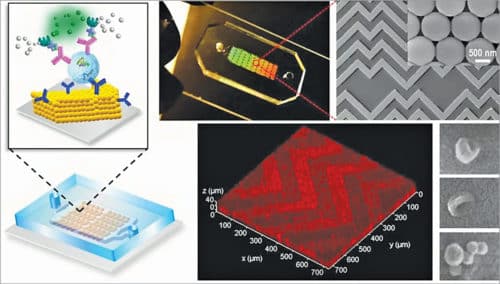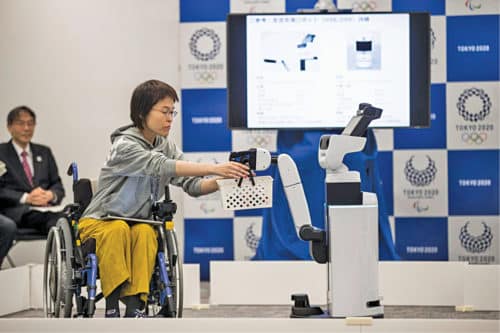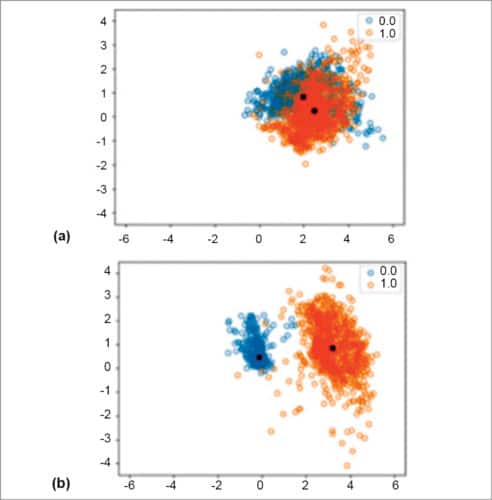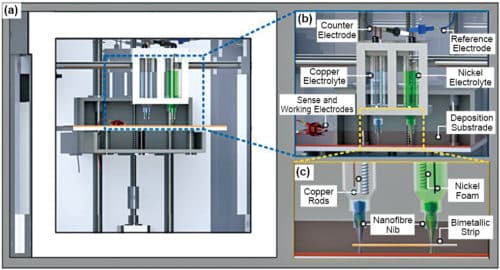Lab-on-a-chip detects cancer faster, cheaper and less invasively
A new ultrasensitive diagnostic device invented by the researchers at University of Kansas, University of Kansas Cancer Center and KU Medical Center could allow doctors to detect cancer quickly from a droplet of blood or plasma, leading to timelier interventions and better outcomes for patients. The lab-on-a-chip for liquid biopsy analysis detects exosomes, which are tiny parcels of biological information produced by tumour cells to stimulate tumour growth or metastasize.
Lead author Yong Zeng, Docking Family Scholar and associate professor of chemistry at KU, said, “Historically, people thought exosomes were like trash bags that cells could use to dump unwanted cellular contents. But in the past decade, scientists have realised these were quite useful for sending messages to recipient cells and communicating molecular information important in many biological functions. Basically, tumours send out exosomes packaging active molecules that mirror the biological features of parental cells. While all cells produce exosomes, tumour cells are really active compared to normal cells.”
“People have developed smart ideas to improve mass transfer in microscale channels, but when particles are moving closer to the sensor surface, they are separated by a small gap of liquid that creates increasing hydrodynamic resistance,” Zeng added. “Here, we developed a 3D nanoporous herringbone structure that can drain the liquid in that gap to bring the particles in hard contact with the surface where probes can recognise and capture them.”
Zeng compared the chip’s nanopores to a million little kitchen sinks, “If you have a sink filled with water and many balls floating on the surface, how do you get all the balls in contact with the bottom of the sink where sensors could analyse them? The easiest way is to drain the water.”

To develop and test the pioneering microfluidic device, Zeng teamed with a tumour-biomarker expert and KU Cancer Center Deputy Director Andrew Godwin at KU Medical Center’s Department of Pathology & Laboratory Medicine, as well as graduate student Ashley Tetlow in Godwin’s Biomarker Discovery Lab. The collaborators tested the chip’s design using clinical samples from ovarian cancer patients, finding the chip could detect the presence of cancer in a minuscule amount of plasma.
The new lab-on-a-chip’s key innovation is a 3D nanoengineering method that mixes and senses biological elements based on a herringbone pattern commonly found in nature, pushing exosomes into contact with the chip’s sensing surface much more efficiently in a process called mass transfer (Credit: KU News Service/University of Kansas)
Scientists gain clues into how deep brain stimulation can help tackle Parkinson’s symptoms
Deep brain stimulation is a treatment used for late-stage Parkinson’s disease that involves surgically implanting thin wires, called electrodes, into the brain. These wires deliver small electric pulses into the head, which help reduce slow movement, tremors and stiffness.
However, scientists have been unsure how the treatment, which is given to around 300 patients a year, tackles Parkinson’s symptoms.
Dr Kambiz Alavian, senior author of the study from Department of Medicine, Imperial College London, said, “Deep brain stimulation has been used successfully to treat Parkinson’s for more than 20 years, and is often offered to patients once medication no longer controls their symptoms. But despite the success of the treatment, we still do not know exactly how delivering electric pulses to brain cells creates these beneficial effects.
Our results, despite being at an early-stage, suggest electric pulses boost batteries in brain cells. This potentially opens avenues for exploring how to replicate this cell powerup with non-surgical treatments, without the need for implanting electrodes in the brain.”
The early-stage study done by researchers at Imperial College London suggests the treatment boosts the number and strength of brain cell batteries called mitochondria. These batteries, in turn, provide power to brain cells, which may help reduce problems with movement and tremors.
Floating solar panels to power mines, save water
Chile is testing a floating island of solar panels as a way to generate clean energy and reduce water loss at mine operations, a cornerstone of the Andean country’s economy that uses huge amounts of electricity and water. The experimental Las Tortolas power-generating island is being run by the giant Anglo-American mining company at its Los Bronces mine, and the initiative comes as the government pushes to put Chile at the forefront of renewable energy use in Latin America and the world.
According to Fox News, the 111.5sqm (1200-square-feet) array of solar panels floats in the middle of a pond, which is used to contain the refuse from mining, known as tailings. It is expected that its shadow will lower the water temperature and reduce evaporation by 80 per cent. Thus, the mine would retain more of that water for its operations and could reduce the amount of fresh water it pumps in the dry mountainous region where water is a scarce commodity.

“With this system, we can make our fresh water consumption more efficient, in line with our goal of re-imagining mining and reducing Anglo-American’s fresh water consumption by 50 per cent by 2030, as well as the CO2 emissions by producing non-polluting energy,” said Patricio Chacana, Los Bronces’ vice president of operations.
The island of solar panels could give purpose to mine refuse in Chile by using them to generate clean energy and reduce water evaporation (Credit: Fox News)
Tokyo unveils chatty robot-eers for 2020 Olympics
Organisers of Tokyo Olympics have rolled out a pair of chatty robots, who will be put to work on assisting wheelchair users at the 2020 Games. Referred to as distant relatives to Star Wars drone R2D2, Toyota has unveiled its human support robots (HSRs) and delivery support robots (DSRs), which are set to act as seat ushers—they will fetch food and drinks for disabled fans at next year’s Olympics.
In an Olympic first, the waist-high, robotic volunteers will casually introduce themselves to customers, who will then be able to place orders on a tablet. “Hello, everyone! I’m a lifestyle support robot,” the fully rotating HSR said in a demonstration. “I’ll fetch things for you. I also have an extendable arm that can pick things up if you drop them,” it added.

In reality, the DSR deli-bot—with its built-in drinks tray—more closely resembles a moving dustbin with blinking lights, but Toyota insisted that the technology would ensure a more comfortable Games experience for wheelchair users.
Minoru Yamauchi, general manager of 2020 robot development department, told AFP, “In the run-up to the Olympics we will work on other useful functions that these can carry out.”
Toyota is currently planning to deploy 16 units of each droid at the 2020 Olympics. Games organisers have also unveiled a Panasonic-developed exoskeleton suit to help with a range of Olympic-related chores, such as delivering or loading heavy baggage brought to Japan by athletes and officials.
Toyota’s HSR human support robot delivers a basket to a woman in a wheelchair during a demonstration of Tokyo 2020 Robot Project for the Olympic Games in Tokyo (Credit: AFP)
AI system that continually learns
Artificial intelligence (AI) systems are driving technology advancements in many commercial and government applications such as speech recognition and autonomous robotics. However, current systems are not able to handle new scenarios that these are not trained on. AI systems today can repeatedly make the same mistakes. Even with retraining, the systems are prone to catastrophic forgetting when a new item disrupts previously-learned knowledge.
To address these limitations, SRI International is developing a next-generation AI system that can learn continuously and apply that learning to become better and more reliable at performing new tasks. The work is being done under Defense Advanced Research Projects Agency’s (DARPA’s) Lifelong Learning Machines (L2M) programme.

SRI researchers are training AI agents using real-time strategy games such as StarCraft II. Using deep reinforcement learning methods, AI agents are trained with surprises injected into the game (for example, terrain and unit capability change). Using this method, key metrics for life-long learning metrics such as adaptation, robustness and safety can be measured.
Overlapping tasks in latent space (blue/orange) makes Lifelong RL training prone to forgetting (a), while our generative memory and task encoding separate the latent space to ensure efficient memory use to avoid forgetting (b) (Credit: SRI International)
3D desktop prints 4D multi-metal objects
4D printing can now create complex 3D geometries that react to environmental stimuli, opening new design opportunities in materials science. A vast majority of 4D printing approaches use polymer materials, which limit the operational temperature during the process of engineering. In a recent study, Xiaolong Chen and co-workers at Dyson School of Design and Engineering, Department of Earth Science and Engineering and Department of Materials at Imperial College of London, UK, have developed a new multi-metal electrochemical 3D printer. The device can construct bimetallic geometries by selectively depositing different metals with temperature-responsive behaviour programmed into the printed structure.
In the study, scientists demonstrated a meniscus confined electrochemical 3D printing approach using a multi-print head design and nickel and copper materials as examples—the ability can be transferred to other deposition solutions.

Additive manufacturing, popularly known as 3D printing, can fabricate complex 3D architectures by sequentially joining materials layer-by-layer. Flexibility of this technique has found applications in aerospace, automotive, medical and energy industries. At first, applications of additive manufacturing focused on the use of polymers to ease consolidation, either via photo-polymerisation (stereolithography) or thermal processes (such as fused deposition modelling). However, increased uptake of metal-based additive manufacturing has now transitioned the technology from a prototyping tool to engineering end products.
Illustration of low-cost electrochemical multi-metal 3D printer—front view (a), print head setup (b) and detailed view highlighting deposition nozzles and deposited bimetallic strip (c) (Credit: Scientific Reports)
Samsung TVs could soon be completely wireless
Last year, Samsung Electronics filed a patent with World Intellectual Property Office (WIPO) for a wireless power transceiver and display apparatus. The patent describes a system in which there will be an electromagnetic bar mounted in between the TV and the wall. It will draw power from a base station that would also double up as a soundbar—that is where the TV will get its power from. This would result in a TV that does not require any cables or wires to keep itself powered. Although, it is to be seen how a set-top box or another device would be attached to it.







